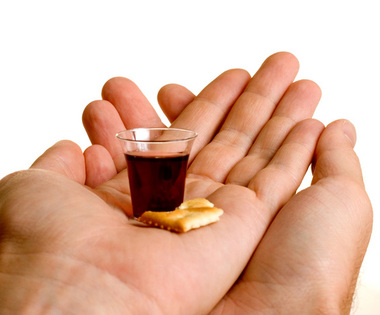|
I love it when God speaks to me through a serendipity. He often does it through repeated words or phrases that reappear in pairs or clusters - for a day, a week, a season. Some people might argue that my experiences are coincidences or that my mind is finding patterns because that's what it's hard wired to do. Oddly enough, that's exactly what makes yesterday's serendipitous moment profound to the point of transcendence...because it was all about the brain and spirituality, or as the book that started this whole thing calls it: "neurotheology."
About three weeks ago we were on vacation and stopped into a thrift shop where I found a copy of Fingerprints of God: What Science Is Learning about the Brain and Spiritual Experience by Barbara Bradley Hagerty. I vaguely remembered having read about it and being intrigued, so I was pleased to score such a deal on a relatively new book. Initially, I was captivated, both by the subject matter and the author herself - a "mainstream Christian" (whatever that means) NPR religion reporter on a paradoxically personal and objective quest to explore the relationship between the brain and God. About halfway into it, though, I struggled with going forward. Two things were happening: 1) my specific belief system was challenged (much like the author herself) by the fact that people of all religions have the same kind of brain activity when meditating or praying; 2) spirituality was defined as having mystical experiences, even though that is not the stuff of day-to-day faith, nor do most Christians (pentecostals aside) have other worldly conversions or supernatural seeming encounters. In fact, many never do. Still, it was a fascinating topic and I wanted to finish the book, so I kept reading. Yesterday I read about brain scans that scientists studying neurotheology performed on "spiritual virtuosos": Newberg found another peculiar similarity. With both the nuns and the [Buddhist] monks, the parietal lobes went dark during deep prayer and meditation.Newberg calls this "orientation area" because it orients you in time and space: those lobes tell you where your body ends and the rest of the world begins. That is why Sister Celeste (and countless other mystics) described a unity with God, or as she put it, 'God permeating my being' It was the neurological reason that Michael Baine felt a "deep and profound sense of connection to everything, recognizing that there was never a true separation at all." (p. 174) Later that day, I received some books from my Amazon wish list that I had ordered using a gift card from my birthday. It was a little like Christmas, getting these packages several days in a row. That night, I took a stack of my new books up to bed, and decided to a read a chapter from each - sort of a literary nosh, if you will. In the introduction of one of them, SoulTypes: Matching Your Personality and Your Spiritual Path, I read this passage: A group of scientists interested in exploring whether there are brain-based differences that determine our religion are using the type of prayer described there to define who is and isn't "spiritual." In all religions, these neuroscientists say, mystical, spiritual moments happen when parts of the brain (parietal-lobe circuits) go quiet, turning off your ability to distinguish between the body and its surroundings. Without sensory data, you feel a sense of being part of infinity or, for the religious, being "one with God." They use SPECT scans to determine whether the person is having such an experience. Building on this research, books such as The God Gene describe how we either are or aren't wired for faith. Kenneth L. Woodward, a religion journalist for Newsweek, points out the problem with this approach: "The chief mistake these neurotheologians make is to identify religion with specific experiences and feelings. Losing one's self in prayer may feel good or uplifting, but these emotions have nothing to do with how well we communicate with God. In fact, many people pray best when feeling shame or sorrow, and the sense that God is absent is no less valid than the experience of divine presence." As I read that, I had an emotional experience - not of the presence of God, but of excitement over him having clearly communicated with me. He didn't do it through my feelings, an audible voice, or a supernatural sign - he did it through my life. He did it by leading me in one day to two books dealing with spirituality, which otherwise were totally unrelated, yet intersected at this one specific point, from whence they each went in very different directions. God used the second book to reassure me by validating/confirming the very thoughts that had come to my mind while reading the first book. It was especially powerful because it was merely a sidebar, so to speak, in the second book, and I therefore had no way of knowing that topic would be addressed, let alone that I would discover it just at that time!
2 Comments
Why is that during the most serious part of the church service, I feel the most silly? Well, it came to an embarrassing crescendo last Sunday...
It started months ago with the big pieces of crackers. I didn't mean to grab the one the size of Texas, but there I was crunching away for what seemed like an eternity. The generous portions of matzo continued, and my husband and I started noticing that not only were they the size of large states, they were the shape of them also. So naturally we had to show to each other - "I got Florida." "Mine looks like Utah." "Giggle, giggle, quack" (okay, there were no duck voices - I just know way too many children's book titles). Sometimes we played it safe and had small half moons of gluten-free rice wafers. Then there was the wine - ruby port actually - encircled by its non-alcoholic counterpart. Having only ever experienced Baptist flavored churches where all we got was Welch's grape juice, and only once a month at that, as soon as we joined a Presbyterian church last year, I knew I would always choose the real deal, just like Jesus drank at the last supper (don't let the teetotalers fool you). Probably because it's still new, it makes me a slightly giddy, like tee hee, I'm drinking *real* wine in church. Silly, I know, but I'm that girl. My husband, who is funny ninety percent of the time, mentioned to me that he likes taking the communion cup in the exact center of the tray. So I began noticing whether it was there or not when we would get up to the front, and every so often, I would take it just for fun. We'd have a silent chuckle over that - or if he got it, he would give me those smiling eyes and nod of victory. As if it weren't enough with all the whispers and stifled giggles between us, my mom and stepdad started sitting next to us during the service. They volunteer to prepare communion, so she has the inside scoop on details I would have been better off not knowing. For example, when I showed her the ginormous piece of cracker I ended up with one morning, she told me that it's really hard to break up the matzo. This is funny in itself, but moreso because we're Jewish by birth. She's also the one who told me that it's not kosher wine (I had thought it was Manischewitz) but port that they pour into the tiny plastic cups. Well, one week ago today, the humorous energy that had been gradually intensifying reached critical mass, and the amusing details combusted into utterly uncontrollable hilarity. I went up to receive the elements, and as I always do, I made eye contact when the person holding the "bread" tray said "His body broken for you," but as I grasped the cracker, I realized I had two pieces. For a split second, I thought of putting one back, but they felt stuck together, and I had already touched them...and I couldn't hold up the line, so concealed my double portion and my amusement, took the cup and looked up for "his blood shed for you," and made my way back to my seat, grinning widely. I couldn't help but show my husband and my mom the extra cracker, which they also found funny. My mom then mentioned that there are always lots of leftovers, so not to worry, and that my stepdad drinks the extra wine. So there I got this ridiculous visual of him guzzling these tiny glasses of port in the church kitchen, and I could feel the laughter welling up in me. I tried to suppress it but suddenly I noticed all these white crumbs on my black pants, which I battled to brush off of me. A few seconds later, I saw my mom doing the same thing - dusting her lap with her hands. It was all just too much. My body began heaving and I had to bury my quivering face in my hands, my head shaking and tears beginning to escape the corners of my eyes (later I was to discover I had raccoon eyes from my smearing my mascara). My stomach suppressed the hysterics, but I faintly emitted a sound like sobbing, which is what I sheepishly wished people would think I was doing instead of laughing! It took me the rest of the communion time to pull myself together, and only just barely. I wish I could say it was holy laughter, but on the surface at least, it sure seemed carnal. I had, week by week, let my mind wander into these trivial details - the literal aspect of the ritual - rather than staying focused on the symbolic significance of the Eucharist. Not that I hadn't tried, mind you, to shut out these distractions (and, in fact, they occur throughout the whole service), but I had not forced myself into submission. In a way, I see what happened as evidence of grace. Yes, I was embarrassed, but I also felt a sense of release and relief - both emotionally and in terms of not being able to project any sort of pious image. That's me, people, showing you that I don't have it all together, not even in the moment when I "should" be closest to the throne of God. Then again, who's to say that in his presence, in the fullest experience of the most important release of all - from sin to freedom - there wouldn't be uninhibited rejoicing? Tears and laughter are made of the same stuff, I've heard it said, or if I didn't, I'm saying it now. Afterwards, a lovely woman (who happens to be the director of children's ministry) came up to me and said she just had to ask what made me crack up. I told her the whole story (well, not as detailed as this) and we couldn't help but laugh together. Apparently joy is contagious - I almost wish I had let it all out and that the whole room had burst into laughter, but that will probably have to wait until heaven..."therefore, let us keep the feast"...and our sense of humor. |
Categories
All
|


 RSS Feed
RSS Feed
